- 리얼 ID 시행 첫날… LAX 등 전국 공항 ‘순조’… DMV는 ‘북적’
- 연준, 기준금리 3회 연속 동결
- 가주 변호사 시험 ‘대혼란’ 결국 소송전으로
- LA서 또 홍역환자… 올 4번째
- 굴뚝에 ‘검은 연기’… 신도들 ‘탄식’
- 선천적 복수국적자 한국 체류 “까다롭네”
close
- 기준금리 동결 배경·전망… “경제 전반 불확실성 더 증가… 신중해야”
- ‘라이트 에이드’ 약국 파산보호 신청
- 중국산 수입비중 11%… 20년래 최저
- 연방의회, 조선업 부활법안 초당적 발의
- 마텔, 가격 인상 계획 장난감 업계 관세 타격
- 가주한국기업협회, LA·롱비치 항만 방문
close
- ‘우승 길목’ 토트넘, 보되/글림트 원정서 웃을까
- 이정후, 22경기 만에 홈런+12경기 만에 멀티 히트 활약
- 커쇼, 마이너리그 재활서 6이닝 ‘노히트’
- 김혜성, MLB 마이애미 상대 4타수 2안타 1타점…타율 0.417
- 손흥민, 유로파리그 4강 2차전도 결장… “아직 팀 훈련 안 해”
- 이정후, 컵스 상대 5타수 무안타…시즌 타율 0.301
close
- 10대들 ‘알바’ 보다 ‘창업’… ‘수익 창출·입시 준비’ 1석2조
- 공화당, 학자금 대출 대수술… 저소득층 학비 부담 가중
- 경쟁을 넘어 가능성으로: 한국 교육, 다시 ‘배움의 기쁨’을 향하여
- ‘갭이어’를 위한 입학 연기 신청은 이렇게
- 보기 드문 귀한 인재
- 빗나간 재정보조, 무엇이 문제인가? (3)
close
- 유방암 치료하면 안심? 체중변화, 또다른 병 부른다
- 재채기만 했을 뿐인데 골절… 척추압박골절 피하려면
- 뇌졸중, 당뇨랑 무슨 상관? 치매 위험 2배 가까이 뛴다
- 단일공 로봇수술했더니… 식도암 회복속도↑ 통증↓
- 늘 먹던 약인데 왜? ‘약물 알러지’의 모든 것
- 수술 힘든 진행성 간암, 면역항암제에 ‘옛날 방식’ 더했더니 효과 높아져
close
- 지구 최대 야외 박물관… “세계사의 명장면이 여기에”
- [주말 뭐 볼까 OTT] 샤를로트 갱스부르(예술영화의 아이콘), 발레 드라마로 코믹 연기 도전
- 죄인을 벌하라는 신의 계시?… 그 목사는 무엇에 홀린 걸까
- 도시와 야생, 예술이 한 경관에… 대륙 끝까지 달려볼까
- ‘미스터리 분위기를 갖춘 가족 관계 다룬 멜로 드라마’
- 중년 남자와 아름다운 피아니스트의 못 이룰 사랑 그려
close
- 트럼프 주택 공약 언제 시행되나?… 취임 100일 지지부진
- 반가운 세금 환급, 집에 투자해 볼까?… 10가지 활용법
- 치열해진 압구정 수주전…홍보관 개관 vs 상표권 출원
- 재건축 돌파구 찾는 ‘노도강(노원ㆍ도봉ㆍ강북구)’… “공원·녹지 의무 비율 낮춰달라”
- ‘교산푸르지오더퍼스트’ 하남교산지구 첫 분양
- 연준의 기준 금리와 부동산 시장2(7탄)
close
- 오드유스, 첫 케이콘 무대와 일본 이벤트로 글로벌 행보
- 결혼식 비용 1억..김종민 “축의금 적자, 행사 뛰어 메꿔야 돼”[신랑수업]
- 박나래, 수천만원대 도난 물품 다 찾았다.. “김지민 덕분”
- 톰 크루즈 12번째 내한…20분간 사인·셀카로 ‘특급 팬서비스’
- 백종원 “방송인 아니고 욕심 없어…내 일은 브랜드 재정비”
- 한국 떠난 이국주 “나랑 일하면 살찐다는 얘기 듣기 싫어서”
close
“Additional $5,000 Burden When Purchasing Foreign Cars”
▶ U.S. Consumers as the Biggest Victims

As President Donald Trump announced a 25% tariff on foreign-made cars on March 26, price increases for popular imported vehicles such as Volkswagen, Hyundai, and Toyota have become inevitable. [Reuters]
The measure targets all foreign-made cars, but it will primarily affect vehicles produced in countries like South Korea, Japan, Europe, Mexico, and Canada.
During a press conference at the White House Oval Office on the same day, President Trump stated, “What we’re going to do is impose a 25% tariff on every car that isn’t made in America.” He added, “We will impose tariffs on countries that have taken jobs and wealth from us over the past few years. Often, friends have been far worse than foes, and this (tariff imposition) is actually quite mild.”
Trump also signed an executive order, saying, “With this foreign car tariff, we expect an annual revenue increase of $100 billion.”
This move by President Trump, aimed at reviving the U.S. auto industry, is expected to deal a significant blow to countries like South Korea, where automobiles are the top export to the U.S.
While automakers from South Korea, Japan, and Europe—such as Hyundai Motor Group—produce vehicles in U.S. factories, a substantial portion of the cars they sell in the U.S. are still manufactured in their home countries, Mexico, or Canada, making the impact of this tariff inevitable.
U.S. car buyers are poised to be the biggest victims of this tariff policy. The Wall Street Journal (WSJ) predicts that the sales price of foreign-made cars sold in the U.S. will rise by at least $3,000 to $5,000 due to the tariff. While the federal government may secure additional tax revenue, this money will ultimately come out of consumers’ pockets.
The WSJ pointed out that going forward, consumers will need to check whether the vehicle they want to purchase is subject to the 25% tariff before making a decision.
Under the U.S.-Korea Free Trade Agreement (FTA), the U.S. has applied zero tariffs to Korean passenger cars, including electric vehicles, since 2016. Last year, South Korea’s total auto exports amounted to $70.789 billion, with exports to the U.S. accounting for approximately 49% ($34.744 billion). Automobiles are South Korea’s top export to the U.S., and in 2023, South Korea ranked as the fourth-largest exporter of cars to the U.S., following Mexico, Japan, and Canada.
With the 25% tariff on automobiles, combined with the “reciprocal tariffs” to be announced on April 2 for individual countries, Korean automakers’ price competitiveness in the U.S. market will inevitably weaken compared to American manufacturers.
Although Hyundai Motor Group plans to steadily increase production in the U.S., many popular models under the Hyundai, Kia, and Genesis brands are still produced in South Korea.
On March 26, Hyundai Motor Group held the groundbreaking ceremony for its third U.S. production site, the “Hyundai Motor Group Metaplant America” (HMGMA) in Georgia. The company has decided to expand the plant’s production capacity from the initially planned 300,000 units to 500,000 units. Hyundai aims to increase its total U.S. production capacity from the current 700,000 units to 1.2 million units in the future.
The auto tariff is the third item-specific tariff imposed by President Trump since the start of his second term on January 20 this year. Previously, the Trump administration imposed a 25% tariff on steel, aluminum, and derivative products made from steel and aluminum imported from all trading partners, effective from March 12.
President Trump specified “April 2” as the implementation date for the auto tariff.
April 2 also marks the day when Trump has pledged to impose “reciprocal tariffs” on all countries worldwide, taking into account their tariff rates and non-tariff barriers against the U.S. Reaffirming this plan, Trump emphasized that he would impose reciprocal tariffs “on every country” without exception.
스마터리빙
more [ 건강]
[ 건강]이제 혈관 건강도 챙기자!
[현대해운]우리 눈에 보이지 않기 때문에 혈관 건강을 챙기는 것은 결코 쉽지 않은데요. 여러분은 혈관 건강을 유지하기 위해 어떤 노력을 하시나요?
 [ 건강]
[ 건강]내 몸이 건강해지는 과일궁합
 [ 라이프]
[ 라이프]벌레야 물럿거라! 천연 해충제 만들기
 [ 건강]
[ 건강]혈압 낮추는데 좋은 식품
[현대해운]혈관 건강은 주로 노화가 진행되면서 지켜야 할 문제라고 인식되어 왔습니다. 최근 생활 패턴과 식생활의 변화로 혈관의 노화 진행이 빨라지고
로컬뉴스
more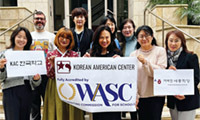
한국어 교육기관 첫 대학협회 인증 받아
비 영리 기관인 ‘KAC‘(Korean American Center, 대표 태미 김, 교장 백금선)가 한국어와 한국 문화를 교육하는 기관 중에…

불기 2569년 부처님 오신날 봉축식
가든그로브 한인타운 인근에 있는 OC 법보선원(선원장 덕일 스님)은 지난 4일 불기 2569년 부처님 오신 날을 맞이해 이 선원(12732 G…
시니어 센터 ‘효 잔치’ 부에나팍 시니어 센터
오렌지카운티 한미시니어 센터(회장 김가등)는 오는 10일(토) 오전 11시부터 오후 3시까지 부에나팍 시니어 센터 헤리티지 룸(8150 Kno…
OC평통 탈북민 단체 간담회 가져
오렌지 샌디에고 민주평통(회장 설증혁)은 지난 5일 부에나팍 더 소스몰 강남 하우스 식당에서 탈북민 단체 임원들과 간담회를 가졌다. 앞줄 왼쪽…
가든그로브 시 무료 대형 쓰레기 수거행사
가든그로브 시는 오는 17일(토) 오전 9시부터 11시까지 가든그로브 공원(9301 Westminster Ave)에서 위생국과 리파블릭 서비스…
사람·사람들
more많이 본 기사
- [교황 선출] 흑인 피도 흐르나…美학자 “레오14세는 크레올 후손”
- [교황 선출] 교회·세속 갈등…레오14세도 트럼프 정책에 부정적
- 김문수 “강제단일화 안돼” 권영세 “대단히 실망”…의총서 충돌
- 중국과 담판 앞두고…트럼프, 월가 달래기에 베선트 투입
- 美국방 “’트랜스젠더 자진 신고’ 군인 1천명 즉각 전역 시행”
- 미국 가구 3분의 1 이상 “1년 뒤 형편 더 나빠질 것”
- 국민의힘, ‘단일후보’ 여론조사 종료…김문수, 영남 방문 취소
- 선천적 복수국적자 한국 체류 “까다롭… 6
- ‘감세 공약’ 트럼프, 연 250만달러 이상 최고 소득자 증세 추진
- [교황 선출] 첫 미국 출신 레오 14세…페루 빈민가서 사목
- 갑질 고발한 PD, 백종원 몰래 대화… 1
- 주파나마 美대사 “역내 악영향 끼치는 중국 차단해야”
- 1,500→1,300원대… ‘널뛰기’ 환율
- 美매체 “미국, 對중국 관세 145%→50%대로 인하 제안 검토”
- 비트코인, 무역긴장 완화 기대감에 10만 달러선 석 달만에 회복
- 반가운 세금 환급, 집에 투자해 볼까?… 10가지 활용법
- 엑스 “인도 정부로부터 8천개 이상 계정 차단 명령받아”
- 영 김 하원의원, ‘관세 발효 48시간 전 의회 보고 법안’ 발의
- 게이츠, 재산환원 서둘러…2045년까지 재단 통해 2천억달러 기부
- 부모 울리는 트럼프 관세…유아용품 직격탄
- 슬기로운시니어생활 23회
- 빅테크 주가, 무역 긴장 완화 기대감에 강세…테슬라 3.1%↑
- 뉴욕증시, 美·英 합의가 불어넣은 낙관론…동반 강세 마감
- 주간 신규 실업수당 청구 22만8천건…직전 주보다 감소
- 부통령 “러가 선의로 협상 안 한다고 판단되면 중재 접을것”
- [교황 선출] 첫 미국인 교황에 美 환호…고향 시카고 축제 분위기
- 재외동포 한국 운전면허증 발급 편리해… 1
- 중국산 수입비중 11%… 20년래 최저
- 방미 ‘이재명책사’ 김현종 “한미·한미일 협력강화 李입장 전달”
- 새교황에 ‘첫 미국 출신’ 프레보스트… 2
- 16위 토트넘 vs 15위 맨유…유로파 결승 ‘폭망 더비’ 성사
- ‘우승 길목’ 토트넘, 보되/글림트 원정서 웃을까
- ‘라이트 에이드’ 약국 파산보호 신청
- ‘첨단 칩 위치 추적’ 연방의회 발의 계획
- 손흥민, 유로파리그 4강 2차전도 결장… “아직 팀 훈련 안 해”
- 재건축 돌파구 찾는 ‘노도강(노원ㆍ도봉ㆍ강북구)’… “공원·녹지 의무 비율 낮춰달라”
- 이재명, ‘험지’ 경북 돌며 1박2일 ‘경청 투어’
- “뜻깊은 날, 마음과 사랑 담은 ‘카후나’로 기쁨 두 배”
- 커쇼, 마이너리그 재활서 6이닝 ‘노히트’
- 연방의회, 조선업 부활법안 초당적 발… 1
- 트럼프 주택 공약 언제 시행되나?… 취임 100일 지지부진
- MS·오픈AI·AMD “세계가 美AI기술을 채택해야 對中경쟁서 승리”
- EU 회원국들 “관세 보복은 나토 정상회의 이후에”
- LA 한인타운서 또 자살 올해 한인 7번째 사례
- [교황 선출] 즉위명 레오 14세… ‘사자’ 리더십·강인함·용기 상징
- 오렌지 카운티의 시니어 단지
- 이정후, 22경기 만에 홈런+12경기 만에 멀티 히트 활약
- 독일 새총리, 트럼프·젤렌스키와 통화…우크라전 종전 논의
- 김혜성, MLB 마이애미 상대 4타수 2안타 1타점…타율 0.417
- 김시우, PGA 트루이스트 챔피언십 첫날 공동 11위
1/5지식톡

-
 애틀랜타 부동산 세미나에 초대합니다
0
애틀랜타 부동산 세미나에 초대합니다
0네오집스가 애틀랜타에 갑니다!안녕하세요? 미국 부동산 네오집스입니다.미국 부동산, 앞으로 어떻게 변화할까요?애틀랜타는 지금 주목해야 할 지역일까요?미국 부동산 시장의 흐름부터 애틀랜타 지역의 최신 동향까지!부동산 …
-
 애플 아이폰 전문 REPAIR SH…
0
애플 아이폰 전문 REPAIR SH…
0애플 아이폰 전문 REPAIR SHOP(로스앤젤레스)추천 해주세요 714-975-4979 서울 종로구 종교 감리교회 1973년~ 중등부 1976년~ 고등부 1979년~ 대학부그리운 친구들 & 김덕형 장로님...덴탈…
-
 ✅애틀랜타 여행의 시작✅DMKTAX…
0
✅애틀랜타 여행의 시작✅DMKTAX…
0애틀랜타 여행의 시작! DMKTAXI.com애틀랜타 최고의 온라인 콜택시 서비스!* 24시간 예약 및 결제: 전화상담 예약은 이제 그만! 모바일 & 웹사이트를 통해 언제 어디서든 예약하고 안전하게 결제할 수 있…
-
 LA OC 및 인근 지역 사업체 매…
3
LA OC 및 인근 지역 사업체 매…
3LA OC 그리고 주변 지역 사업체 매물 볼수 있는 부동산 알나무 Rtree.com 입니다.사업체 파실뿐 ,사실분 상담 잘 해드리겠습니다.이 건승(02101969)/뉴스타 부동산 818-522-0516
-
 모임
0
모임
0서울 수송 초등학교 동창회 2024년12월 마지막 토요일 송년회 모임 714-975-4979
케이타운 1번가
오피니언
 안상호 논설위원
안상호 논설위원선한 것의 능력
 이태규 서울경제 워싱턴특파원
이태규 서울경제 워싱턴특파원 트럼프 ‘영화 관세’에 할리웃이 반발하는 이유
 송명국 칼스테이트 롱비치 교수 마케팅학
송명국 칼스테이트 롱비치 교수 마케팅학 위기를 기회로 바꾼 창조적 혁신
 성민희 수필가
성민희 수필가 [윌셔에서] 그 이름, 엄마
 이영태 / 한국일보 논설위원
이영태 / 한국일보 논설위원[지평선] 끝없는 ‘헌정 초유’ 시리즈
 정숙희 논설위원
정숙희 논설위원문화예술, 트럼프의 척결대상

‘건강한 망상’
 파리드 자카리아 워싱턴포스트 칼럼니스트 / CNN ‘GPS’ 호스트
파리드 자카리아 워싱턴포스트 칼럼니스트 / CNN ‘GPS’ 호스트 중국과의 무역전쟁 피해 이제 시작에 불과
 베로니카 장 페닌슐라 한인학부모회 대표
베로니카 장 페닌슐라 한인학부모회 대표 [수요 에세이] 미쉘의 생일선물 오이지 무침
1/3지사별 뉴스

리얼 ID시행 첫날 ⋯공항 보안검색 순조로웠다
리얼ID(REAL ID) 의무화 시행 첫날 미 전역의 대부분 공항에서 순조로운 출발을 보였다. 뉴욕타임스 등에 따르면 리얼ID 의무화가 시행에…
ICE로부터 학생 정보 보호한다

청소년 소셜미디어 사용 규제
하루 종일 휴대폰만 보고 있는 자녀들 때문에 속 터진다는 부모들에게 반가운 소식이 전해졌다. 글렌 영킨 버지니아 주지사가 지난주 ‘소비자 데이…
한국전통문화 모티브로 동화책

새교황에 ‘첫 미국 출신’ 프레보스트 추기경, 선출 후 첫 일성 “평화가 여러분 모두와 함께 있기를”
미국 출신의 첫 교황이 탄생했다.133명의 추기경 선거인단은 8일(현지시간) 제267대 교황으로 미국의 로버트 프랜시스 프레보스트(69) 추…
대선 재외 유권자 25만8천명

오늘 하루 이 창 열지 않음 닫기 



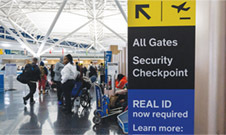
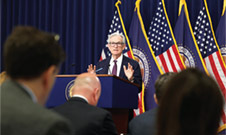











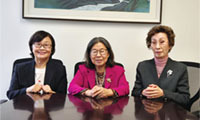
![[인터뷰] “한국 문화 홍보·확산 최선” [인터뷰] “한국 문화 홍보·확산 최선”](http://mimg.koreatimes.com/200/120/article/2025/05/07/20250507223941685.jpg)
















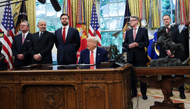


















.png)


댓글 안에 당신의 성숙함도 담아 주세요.
'오늘의 한마디'는 기사에 대하여 자신의 생각을 말하고 남의 생각을 들으며 서로 다양한 의견을 나누는 공간입니다. 그러나 간혹 불건전한 내용을 올리시는 분들이 계셔서 건전한 인터넷문화 정착을 위해 아래와 같은 운영원칙을 적용합니다.
자체 모니터링을 통해 아래에 해당하는 내용이 포함된 댓글이 발견되면 예고없이 삭제 조치를 하겠습니다.
불건전한 댓글을 올리거나, 이름에 비속어 및 상대방의 불쾌감을 주는 단어를 사용, 유명인 또는 특정 일반인을 사칭하는 경우 이용에 대한 차단 제재를 받을 수 있습니다. 차단될 경우, 일주일간 댓글을 달수 없게 됩니다.
명예훼손, 개인정보 유출, 욕설 등 법률에 위반되는 댓글은 관계 법령에 의거 민형사상 처벌을 받을 수 있으니 이용에 주의를 부탁드립니다.
Close
x